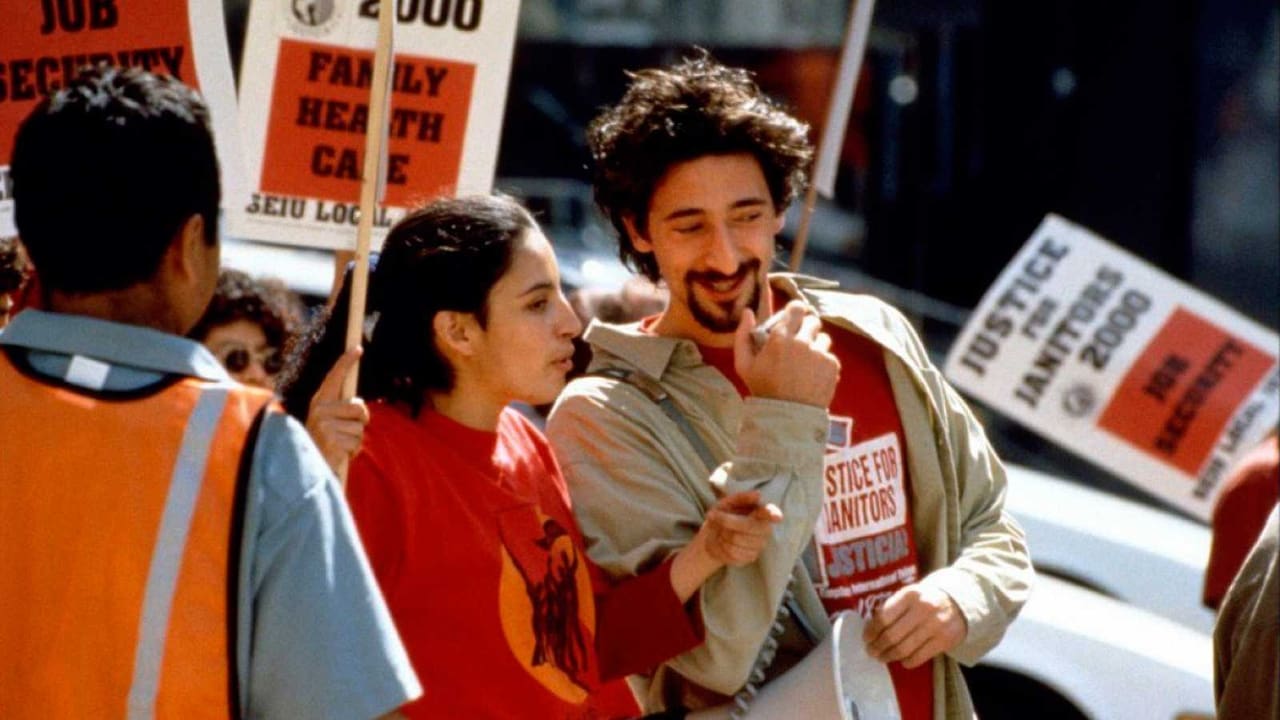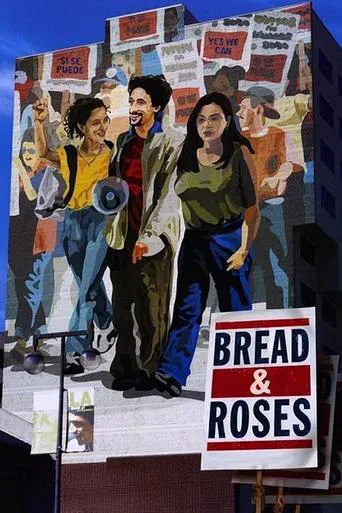

A Brilliant Conflict
... View MoreIt's the kind of movie you'll want to see a second time with someone who hasn't seen it yet, to remember what it was like to watch it for the first time.
... View MoreAll of these films share one commonality, that being a kind of emotional center that humanizes a cast of monsters.
... View MoreThrough painfully honest and emotional moments, the movie becomes irresistibly relatable
... View MoreDirector Ken Loach describes in the film "Bread and roses" the struggle of an American trade union in order to improve the working conditions of the janitors. And they are actually victorious, since finally the firm gives in to their demands. So on the surface Bread and roses is another homage to the search for freedom and justice. Joke, to make this review more attractive: a lawyer, who assists a client in a law suit, calls him: "Justice has prevailed!" The client replies: "So we have lost the case?" Loach is like that. Although his films always concern the socially deprived, the personal shortcomings of the main characters dominate the social injustice. This makes his films rather gloomy, since the viewer finds it hard to identify with the characters. Bread and roses fits particularly well in this scheme of Loach. Although probably the "Justice for janitors" campaign was not as glorious as its reputation, Bread and roses really sketches an unfavorable image. The main character Maya is selfcentred and almost devoid of morals. She has a knack for making strangers immediately. When she enters the USA from Mexico as an illegal immigrant, she and her sister Rosa even cheat on the human traffickers. Maya accepts a job offer in a public house, but she soon gets into a fight with customers. Then she wants to work as a cleaning woman, just like her sister Rosa. The husband of Rosa is unemployed, he suffers from diabetes, and has never paid for health care insurance. Rosa is a former prostitute, who is still in the habit. She does not even know who is the father of her children, so apparently she economizes on contraceptives. If here Loach mocks at her, I find it a bit morbid. In her cleaning work Maya retains her lax attitude. Just one detail: she uses the stationery of the clients of her cleaning firm to write her personal letters. Hard work never killed anybody, but why take the chance? Her colleagues are industrious. Maya complains that they do anything for the money. However, it must be admitted that her employer is harsh. For instance, he does not pay for health care. So the firm has low costs, and ousts the unionized competitors from the market. Obviously the union dislikes this. Therefore one of her organizers instigates the workers of the cleaners firm, including Maya, and harasses its clients. He does not shun aggressive methods, like disturbance of the domestic peace. Maya, who always loves to complain, agitates for the union. At the same time, she robs an employee of a gas station, who tries to help her. She is indeed a prime candidate for natural de-selection. In the end she is arrested. The state offers her a lawyer free of charge, but she asks for a witness for the defence (joke). Maya is expelled to Mexico, without imprisonment. Incidentally, it strikes me, that Loach imputes a hatred of the American society to the illegal immigrants in his film. So how should Bread and roses be rated? The quality of Loach films lies in their excellence in showing the room for social improvements. But personally, I prefer films that show at least a glimpse of human kindness and decency.
... View MoreYou have to admire good, worthy Ken Loach. Always admirable in motive and honest depiction, he is Britain's true indie maverick.However, when he moved this production and story to L.A., even I felt a bit cheated and I'm sure a few lost allegiance for the director. But, just because it (at least at first) seems to lacks the kaleidoscope of colourful characters that we can identify with when he's shooting on home soil, it's about the people and in this case, Mexican workers employed illegally by a large non-union contractor as office cleaners.I've heard of Americans requiring subtitles in order to decipher a thick Glaswegian accent and here we experience lots of subtitles, as much of the dialogue, from a largely amateur cast, is in Spanish. We, who're used to such soon get used to this but it's all a slight barrier and uphill struggle before we feel submersed into the story.The story itself won't be recited around campfires for years to come and the dialogue is more of your typical bitty everyday conversation than the lovingly crafted screenplays that win awards. The filming, often in similar looking corridors and offices hardly allows for creativity either, but as Mr Loach is the nearest we have to the simplistic approach to the Scandinavian 'Dogme' movement, this comes as no surprise.A charismatic Adrien Brody drops his Oscar winning stature to play a 'Justice For Janitors' unionist and at first we see him hiding around workplaces where he is definitely not welcome. He soon gets on the case of two young women, recently taken on as cleaners but have families to support.Like more locally grown Loach's, there's lots of often grating arguing, raised voices, splashes of humour plus that all-important social message. We, or at least I, perhaps wrongly, however, cannot quite warm to the campaign as much as I do with a British Ken Loach film and like the characters themselves, feel somewhat alienated from both them and their plight.So, far from Ken's best but still not bad.
... View MoreTake a look at the biography of Paul Laverty on this site . A truly remarkable and gifted individual who has led a very interesting life . What a pity then that he didn't sacrifice some of his lust for life by reading up on what makes a good story . Sorry if I'm sounding bitter or personal towards Mr Laverty but is there any type of market for this movie ?BREAD AND ROSES is the story of Maya , an illegal immigrant from Mexico whose sister Rosa gets her a job as a janitor . Being a non union service the work supervisor can hire and fire people on a whim so Maya with some others organizes " A Justice For Janitors " campaign I do concede that not every movie can be LORD OF THE RINGS in epic scope , technical ability or just plain excitement but really who is going to stand out a cinema in the pouring rain wanting to buy a ticket for something like this ? One things for certain - There won't be a long queue in front of you if you do decide to see it I do concede that Ken Loach directed movies are very popular . But only with people obsessed with " social realism " and once again Loach directs a movie with zero commercial appeal . Anyone who has attended any worthy film class will realise there is no longer ( If there ever was ) any type of market for this type of film . Of course some very privileged people who are professional socialists will scream that we need film makers like Loach and Laverty in order to point out the grave injustices of the socio economic divide but I suggest that India , a country that personifies the injustice between the haves and have nots , has perhaps the most successful film industry in the universe and there's no such thing as " social realism " in a Bollywood movie The bottom line for Loach and Laverty is : If you want to send a message try Western Union
... View MoreKen Loach's one-dimensional liberal stance spoils this otherwise entertaining film about an illegal Mexican immigrant, Maya,who finds a job as a cleaner in an anonymous downtown LA skyscraper where her American-based sister, Rosa, already works. The film follows fiery Rosa's plight as an underpaid cleaner, her various conflicts with her sister and her eventual political awakening via the intervention of Adrien Brody's character, Sam Shapiro, a subversive Union representative. The film is a fictional reinterpretation of real life events involving the Justice for Janitors campaign against low pay for cleaners. Despite the human dramas that unfold during the film, Bread and Roses is a thinly-veiled attack on American economical injustice, especially against illegal immigrant workers. Oddly enough, Loach does not balance his Anti-American views against the lack of opportunities and poverty in Mexico. He never considers why Maya has left Mexico. Yes, she wanted to be with her sister - but was this the only reason? it's very easy to take pot shots at North America, but when it's this simplistic, one must question Mr Loach's lack of subtlety as a filmmaker. Overall, Bread and Roses works best as a human drama rather than a political one.
... View More